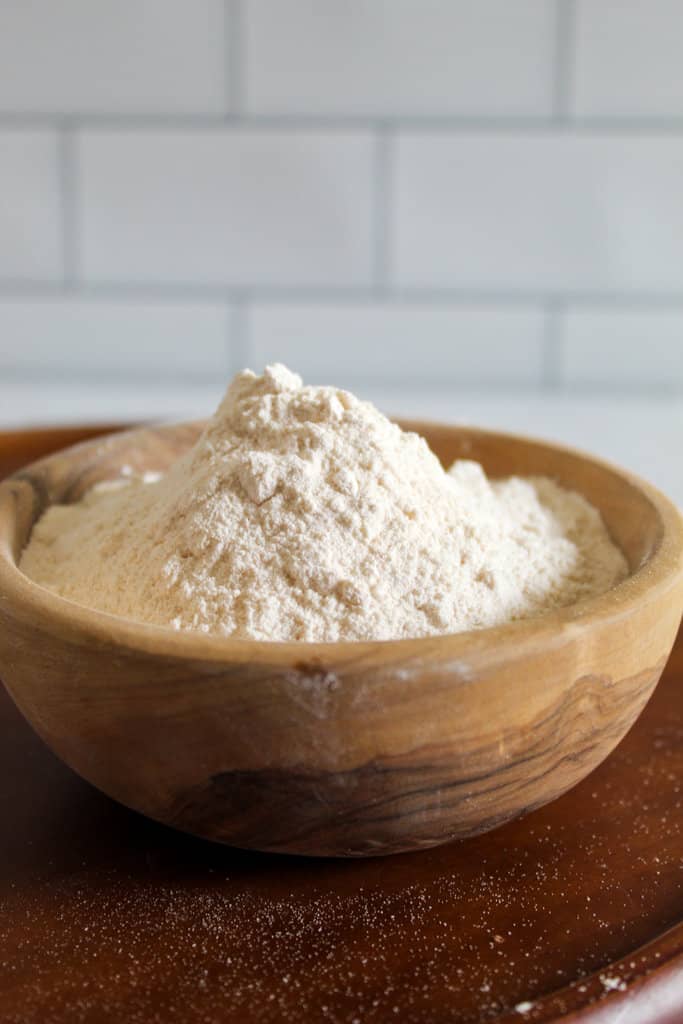Cassava Flour vs Almond Flour: How to Use & Best Substitutes
If you’ve been a gluten-free baker for even a minute, you may already have both of these flours in your pantry. But what’s the difference between cassava flour vs almond flour, and which one do you use when? In this post, I’ll break down the differences between these gluten-free flours to help you find the right one for your next bake!

Gluten-free baking can feel really complicated, especially if you’re new to the gluten-free diet. It can be tempting to replace regular flour with whatever you have on hand, but it’s very important to choose the appropriate substitute for your recipe. Although some people like to use cassava flour and almond flour interchangeably, they are quite different, and it helps to understand these two flours a little better before you change them out!
Table of Contents
Looking for more expert resources on gluten-free flours? Check out this post on tapioca starch, this one on coconut flour, and this one on substituting cornmeal.
Cassava Flour vs Almond Flour: Key Takeaways
These two flours are very different from one another. Almond flour comes from ground almonds, whereas cassava flour is made by processing the root of the cassava plant.
Almond flour is high in fat, low in carbohydrates, and has a slightly gritty texture with a nutty flavor. It is commonly used for people on the keto diet, and it is not suitable for people with a nut allergy.
Cassava flour is low in fat, high in carbohydrates, and has a soft, powdery texture with a mild flavor. It is a great alternative to regular all purpose flour. This is a popular paleo flour since it comes from the whole root of the cassava plant, but due to its high carbohydrate count, it is not a good option for low carb dieters.
Sometimes, they can be swapped, but not all the time. For best results, I recommend replacing 1 cup of cassava flour with 2/3 cup almond flour and 1/3 cup tapioca starch. If you are replacing almond flour with cassava, you typically use equal amounts but you may want to add more liquid and increase the fat content.
What is Cassava Flour?
Cassava is a root vegetable from South America that is also popular in Africa and Asia. Also called the yuca plant or manhiot, the root grows as a long tuber underground and tastes similar to a white potato or a mild sweet potato.
To make cassava flour, the whole cassava root must be peeled, then dried and milled into a fine powder. It does contain trace amounts of cyanide compounds, but those disappear after processing.
Cassava flour is a traditional flour that is used around the world and certainly deserves a place in your gluten-free pantry!
Best Cassava Flour Substitutes
All out of cassava flour? Try these popular alternatives instead:
- Gluten-free flour mix
- Almond flour
- Brown rice flour
- Quinoa flour
- Millet flour
- Arrowroot powder
- Tapioca starch
Learn more about substituting cassava flour here.
What is Almond Flour?

Made from blanching, peeling and grinding whole almonds, almond flour is an extremely popular gluten-free alternative to regular wheat flour. It’s also naturally low in carbohydrates, which is why it is so popular on the ketogenic diet as well.
Since it comes from nuts, it is also high in healthy fats, making it very calorie-dense. The high fat content makes it ideal for gluten-free recipes like pie crust or shortbread cookies, but it can be hard to get a fluffy texture without adding a thickening agent or another type of flour to absorb the excess moisture in your recipe.
I recommend replacing every 1 cup of cassava flour in your recipe with ⅔ cup of almond flour and ⅓ cup of tapioca starch.
Best Almond Flour Substitutes
If you need to replace almond flour in a recipe, try these options instead. Learn about the 6 best almond flour substitutes here.
- Oat flour
- Cashew flour
- Sunflower seed flour
- Macadamia nut flour
- Peanut flour
- Chickpea flour
These are my favorite alternatives, but you can really use any nut flour, like pecan flour or hazelnut flour. Do not use almond meal as it is different from almond flour.
Cassava Flour vs Almond Flour: What’s the Difference?
Nutritional Information
One of the most obvious differences between these two alternative flours is the nutritional information. Almond flour is naturally low in carbohydrates and high in fat, which is part of why it is so popular on a low-carb diet. Cassava flour is made from a sweet root, so it’s much higher in carbohydrates and lower in fat and protein.
- One cup of cassava flour – 456 calories, 0.8 g fat, 108g carbohydrates, 5.1g dietary fiber, 3.9g protein
- One cup of almond flour – 650 calories, 56g fat, 24g carbohydrates, 14g fiber, 24g protein
Allergens
Since almond flour is made from almonds, it is not suitable for people with nut allergies. It is uncommon, but some people with latex allergies are also allergic to cassava root.
Usage
Almond meal and cassava flour are quite different; however, they can both be used to make delicious gluten-free bakes.
Cassava flour feels much more like wheat flour than almond flour does, and it is one of the best alternatives for white flour in gluten-free baking. It can be used as a 1:1 replacement for flour, but you typically need less cassava flour and extra moisture. You’ll usually see it in a variety of baked goods, like breads, tortillas, cookies, and more.
Almond flour can be used as a gluten-free option for many baked goods, but it will not have the same soft, silky texture as traditional wheat flour or even cassava flour.
Even the finest almond flour still has a slight grittiness to it and a noticeable nutty flavor, although it’s quite wonderful in cookies, tortillas, or brownies. It can be tricky to make almond flour ever feel really light or fluffy without using an additive, like psyllium husk fiber or xanthan gum, or blending the almond flour with a gluten-free flour blend. It is also popular as a low-carb breading for savory dishes!
Cost
It is often easier to find almond flour than cassava flour, especially at your local grocery store. The prices tend to vary for almond flour, but it usually costs between $4-6/lb, depending on quality and quantity. Cassava flour is slightly more expensive than that at about $5-8/lb on Amazon.
Find these in my Amazon store!


